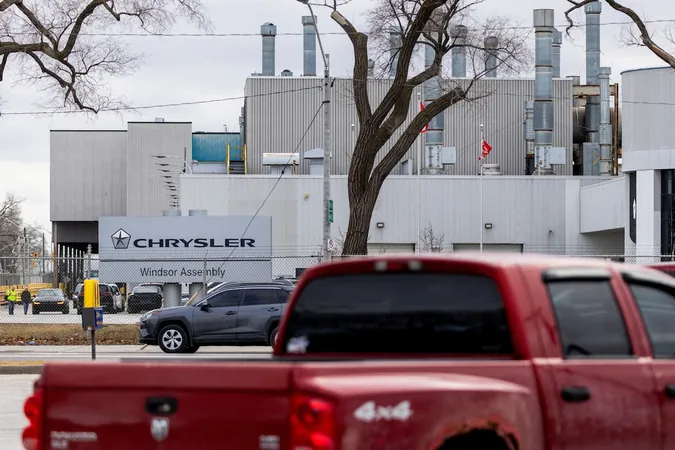
Major Disruption in Auto Industry: Stellantis Halts Production Amid Tariff Uncertainty
2025-04-03
Author: Charlotte
In a significant turn of events for the automotive industry, Stellantis NV has announced a halt in production at its assembly plants located in Windsor, Ontario, and Toluca, Mexico, while also laying off 900 workers across six factories in the United States. This decision comes as the company navigates the ramifications of recently implemented tariffs on imported vehicles by the U.S. government.
Production Shutdowns and Worker Layoffs
The Windsor plant, known for manufacturing popular minivan models and the Dodge Charger, will temporarily shut down for a two-week period starting April 7, impacting approximately 3,200 employees. Meanwhile, the facility in Toluca, where Jeep Compass vehicles are produced, is expected to remain closed for the entire month of April, affecting 2,600 workers.
Impact on U.S. Workers and Supply Chains
The layoffs in the United States will specifically affect production environments in Michigan and Indiana that primarily supply parts to the Windsor and Toluca assembly plants. The affected plants include locations in Warren, Sterling, and Kokomo, which are instrumental in producing essential automotive components.
Company Response and Ongoing Evaluation
Stellantis updated stakeholders by stating, “We will continue to monitor the situation to assess whether further action is required.” The company stressed its ongoing evaluation of the recent U.S. tariffs on imported vehicles and commitment to engage with the U.S. government regarding these policy changes.
Details of the New Tariffs
The new tariffs, which come into effect on Thursday, impose a 25% fee on all imported vehicles—however, vehicles manufactured in Canada that include a significant amount of U.S. content are exempted to some extent. It is noteworthy that about half of the components used in cars produced in Ontario are sourced from the U.S.
Industry Concerns and Reactions
Industry experts have voiced concerns about the broader implications of these tariffs, which are expected to cause significant disruption to supply chains and result in layoffs across numerous automotive supply companies in both Ontario and Michigan. Flavio Volpe, president of the Automotive Parts Manufacturers’ Association, underscored the gravity of the situation, expressing discontent over what he termed an “immediate warning” that the tariffs should be reconsidered.
Union and Political Responses
The labor union Unifor revealed the news of the Windsor plant closure via a Facebook statement, highlighting the cascading effects of the tariffs throughout the entire North American automotive sector and worrying about the long-term implications for both employees and the industry as a whole.
Ontario Premier Doug Ford responded to the shutdown by emphasizing the need for action in Canada. He remarked, “In my opinion, we need to respond. But let’s pray it’s only a couple of weeks that they have to close.” Following discussions with other provincial leaders and Prime Minister Mark Carney, more concrete plans may emerge to mitigate these challenges.
Historical Context and Economic Perspectives
Former President Trump's administration had argued that these tariffs would encourage manufacturers to produce goods domestically, potentially creating new jobs. However, an array of economists warns that such tariffs are likely to provoke inflation and reduce vehicle sales and production rates. They caution that the transition to domestic manufacturing is a complex process that could take years, potentially costing the industry billions.
Broader Implications for the Automotive Market
Considering that nearly 44% of cars sold in the U.S. are imported, the ripple effects of these changes could be extensive. Jonathan Smoke, chief economist at Cox Automotive, echoed these thoughts, stating that while the aspiration of boosting U.S. job creation is commendable, the intricacies of the automotive market cannot be underscored enough.
Conclusion
As the automotive landscape faces this tumultuous shift, stakeholders are left to ponder not only the immediate financial impacts but also the broader economic repercussions that could follow if tariffs persist and production facilities remain idle.









 Brasil (PT)
Brasil (PT)
 Canada (EN)
Canada (EN)
 Chile (ES)
Chile (ES)
 Česko (CS)
Česko (CS)
 대한민국 (KO)
대한민국 (KO)
 España (ES)
España (ES)
 France (FR)
France (FR)
 Hong Kong (EN)
Hong Kong (EN)
 Italia (IT)
Italia (IT)
 日本 (JA)
日本 (JA)
 Magyarország (HU)
Magyarország (HU)
 Norge (NO)
Norge (NO)
 Polska (PL)
Polska (PL)
 Schweiz (DE)
Schweiz (DE)
 Singapore (EN)
Singapore (EN)
 Sverige (SV)
Sverige (SV)
 Suomi (FI)
Suomi (FI)
 Türkiye (TR)
Türkiye (TR)
 الإمارات العربية المتحدة (AR)
الإمارات العربية المتحدة (AR)